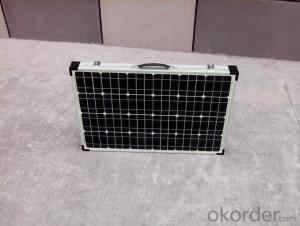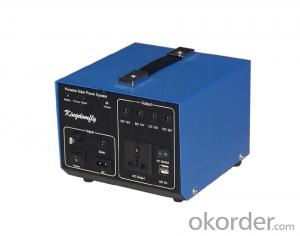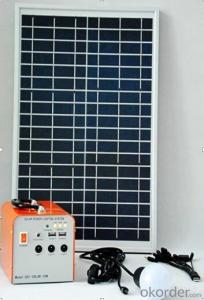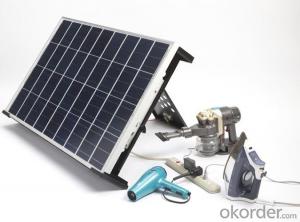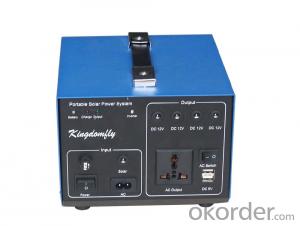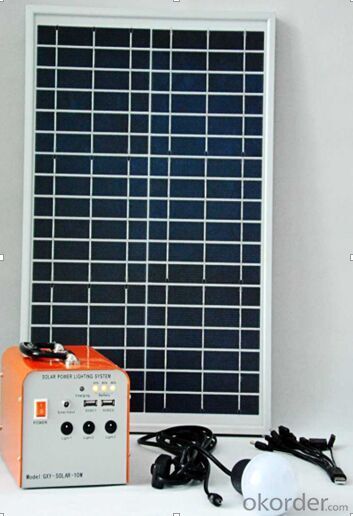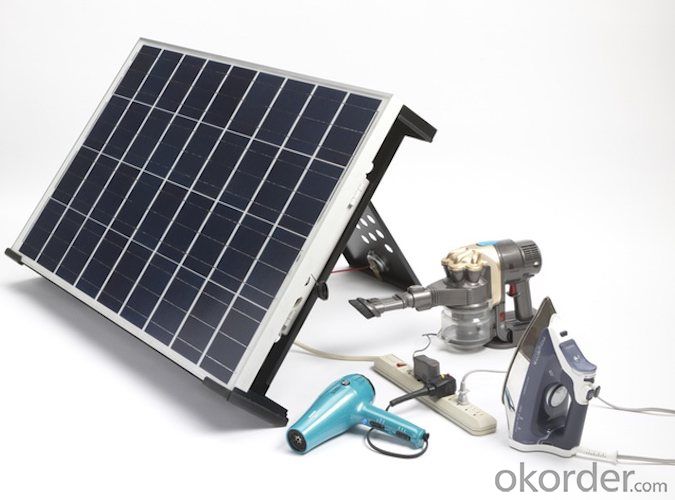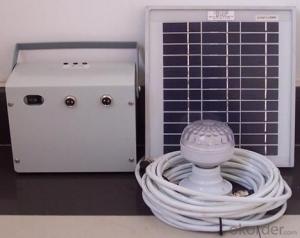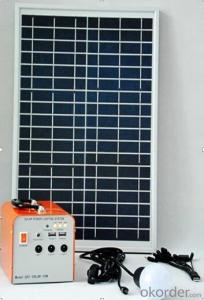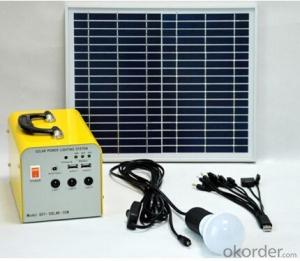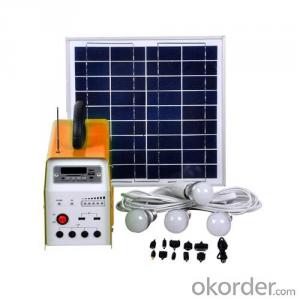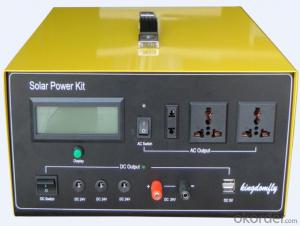Solar Energy Systems Indiana - Solar Portable System AN-S20W
- Loading Port:
- Shanghai
- Payment Terms:
- TT OR LC
- Min Order Qty:
- 0 set
- Supply Capability:
- 10000 set/month
OKorder Service Pledge
OKorder Financial Service
You Might Also Like
Specification
Description of Solar Portable System AN-S20W
Compatible portable solar power supply, also called solar mobile power, it includes: solar panel, charge controller, discharge controller, electric charge controller, inverter, outside enlarge capacity interface and battery, etc. Photovoltaic portable power supply can work in solar energy and ordinary power two modes, and can automatically switch. Photovoltaic portable power supply is used widely is the emergency relief, tourism, army, geological prospecting, archaeology, schools, hospitals, Banks, gas stations, comprehensive building, highway, substation, family camping or outdoor activities such as emergency power ideal power supply equipment.
Specifications of Solar Portable System AN-S20W
1. Solar Panel: 20W 18V
2. Battery: 12V12AH lead-acid battery
Input terminal: 1 DC input, 9V
Output terminal: 4 output terminals, including:
1x USB output, 5V 1A;
3x DC outputs, 6V 1A
Switch: one square On/Off general switch
Indication lamp: 2 pcs; Red one is for charging indication, Green one is for operating indication.
Accessories of Solar Portable System AN-S20W
1. 2pcs 3W led bulbs;
2. 1pc 3m connection wire between solar panel and cabinet;
3. 2pcs lamp holder with 3m wire;
4. 1pc AC charger
Technical Data of Solar Portable System AN-S20W
| Internal Package Size (cm) | 26*16.5*21 |
| Packing QTY | 4 |
| External Package Size (cm) | 30*47*43.5 |
IMages of Solar Portable System AN-S20W
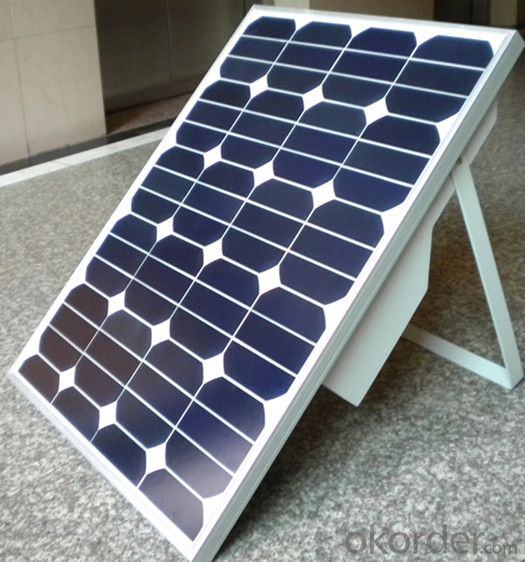
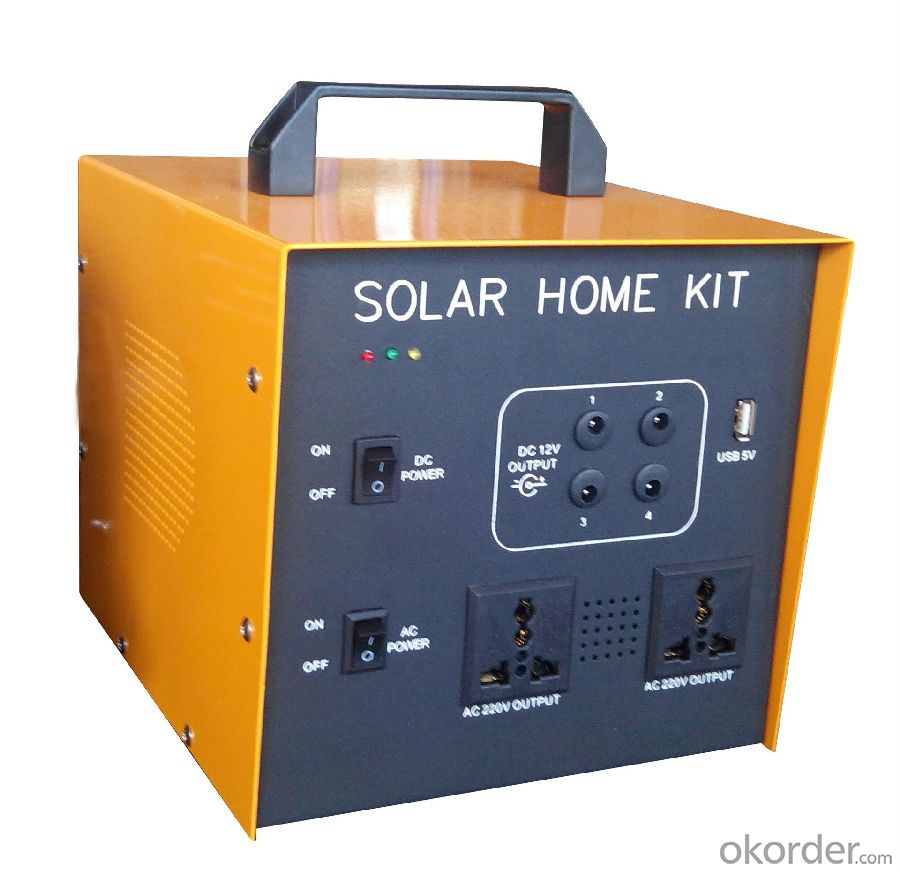
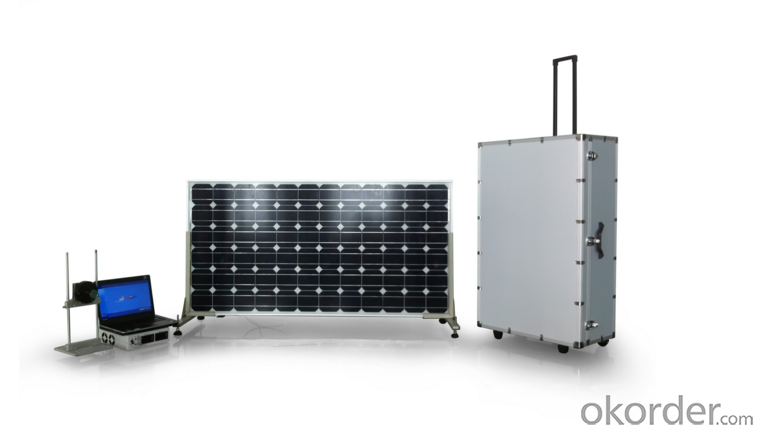
FAQ:
1. How long will my inquiry get response?
Your inquiry related to our products or prices will be replied within 24 hours.
2. Can I get professional service and suggestion?
Well-trained and experienced staffs to answer all your questions in fluent English.
3. Do you accept OEM or customized design?
OEM & ODM, any your customized lightings we can help you to design and put into product.
4. What if I need specific design?
Distributorship are offered for your unique design and some our current models.
- Q: Can solar energy systems be used in areas with limited roof space due to chimneys or vents?
- Yes, solar energy systems can still be used in areas with limited roof space due to chimneys or vents. While it is true that solar panels typically require a certain amount of unobstructed roof space for optimal efficiency, there are alternative solutions available for areas with limited roof space. One option is to install solar panels on flat or sloped surfaces adjacent to the roof, such as on the ground or on a nearby wall. These ground-mounted or wall-mounted solar systems can be adjusted to maximize exposure to sunlight, ensuring that the panels still generate a significant amount of energy. Another solution is to use solar technologies that are specifically designed for limited roof space. For example, there are solar tiles available that can be integrated into the roof itself, replacing traditional roofing materials while still harnessing solar energy. These solar tiles can be installed around chimneys, vents, or any other obstructions on the roof, making efficient use of the available space. Additionally, solar energy systems can also be combined with other renewable energy sources, such as wind turbines or geothermal systems, to compensate for the limited roof space. By diversifying the renewable energy sources, it is possible to meet the energy needs of an area even with limited roof space. In conclusion, while limited roof space due to chimneys or vents may pose some challenges, there are still viable options for utilizing solar energy systems. By exploring alternative mounting options, using solar tiles, or combining solar with other renewable energy sources, it is possible to harness solar power in areas with limited roof space.
- Q: How do solar energy systems affect water usage?
- Solar energy systems have a minimal impact on water usage compared to traditional energy sources. Unlike fossil fuel power plants that rely heavily on water for cooling and steam generation, solar energy systems do not require water for their operation. This makes solar energy a more sustainable and eco-friendly option, as it reduces water consumption and helps conserve this vital resource.
- Q: How do solar energy systems impact the energy efficiency of a home?
- The energy efficiency of a home is significantly impacted by solar energy systems. These systems utilize the sun's power to generate electricity, which can then be used to operate various appliances and devices within the household. This reduces the need for traditional energy sources like fossil fuels and helps to decrease greenhouse gas emissions. One major benefit of solar energy systems is that they offer a clean and renewable source of power. Homeowners can generate their own electricity by harnessing the abundant sunlight, reducing their dependence on the grid. This not only conserves natural resources but also decreases the overall carbon footprint of the home. Another way in which solar energy systems improve energy efficiency is through net metering. This system allows homeowners to sell any excess electricity generated by their solar panels back to the grid, offsetting their energy consumption during periods when the sun is not shining. This ensures that the energy produced by the solar panels is used efficiently and not wasted. Additionally, solar energy systems often come equipped with advanced monitoring and control features. These features enable homeowners to track their energy usage in real-time, identifying areas of high consumption and taking steps to optimize energy usage. By making informed decisions based on this data, homeowners can further enhance the energy efficiency of their homes. Furthermore, solar energy systems increase the value of a home. Studies have shown that homes equipped with solar panels tend to sell at higher prices compared to those without. This is because potential buyers are attracted to the idea of reduced energy costs and an environmentally friendly lifestyle. Overall, solar energy systems play a crucial role in improving the energy efficiency of homes. By utilizing the power of the sun, homeowners can reduce their reliance on traditional energy sources, decrease their carbon footprint, and save money on electricity bills. With advancements in solar technology, these systems are becoming increasingly efficient and affordable, making them a viable option for homeowners seeking to enhance the energy efficiency of their homes.
- Q: How do solar energy systems impact energy independence in rural areas?
- Solar energy systems have a significant positive impact on energy independence in rural areas. By harnessing the power of the sun, these systems provide a reliable and sustainable source of electricity, reducing reliance on fossil fuels and centralized power grids. This empowers rural communities to generate their own energy, reducing dependence on external suppliers and increasing self-sufficiency. Additionally, solar energy systems can be easily installed and maintained, making them accessible and affordable for rural households, thus further boosting their energy independence.
- Q: What are the environmental benefits of using solar energy systems?
- Solar energy systems have numerous environmental benefits. Firstly, solar power is a clean and renewable energy source, meaning it does not produce harmful greenhouse gas emissions like fossil fuels. This helps mitigate climate change and reduce air pollution. Additionally, solar energy reduces reliance on non-renewable resources such as coal or natural gas, conserving these valuable resources for future generations. Moreover, solar panels require minimal water for maintenance compared to other energy sources, conserving water resources. Overall, solar energy systems play a crucial role in transitioning towards a more sustainable and environmentally friendly energy future.
- Q: Can solar energy systems be used for powering schools?
- Yes, solar energy systems can be effectively used for powering schools. Solar panels can be installed on school rooftops or in nearby open spaces to capture sunlight and convert it into electricity. This renewable energy source helps schools reduce their carbon footprint, lower energy costs, and provide a clean and sustainable power supply for various activities within the school premises. Additionally, solar energy systems can also serve as an educational tool, allowing students to learn about solar technology and the importance of renewable energy in addressing climate change.
- Q: Do solar energy systems work during cloudy days?
- Yes, solar energy systems can still work during cloudy days, although their efficiency may be reduced. While direct sunlight is the most effective way to generate electricity from solar panels, they can still produce power even with indirect or diffused sunlight. Cloudy days typically diminish the amount of sunlight reaching the panels, resulting in lower energy production. However, advancements in solar technology, such as the use of more efficient panels and improved light absorption, have made it possible for solar energy systems to generate electricity even in less ideal weather conditions. Additionally, solar systems are designed to capture and store excess energy during sunny periods, which can be utilized during cloudy days or at night.
- Q: Can solar energy systems be used for powering electric vehicle wireless charging systems?
- Indeed, electric vehicle wireless charging systems can be powered by solar energy systems. These solar energy systems, such as solar panels, have the capability to capture sunlight and convert it into electricity. This electricity can then be utilized to power a wide range of devices and systems, including electric vehicle wireless charging systems. The process of utilizing solar panels to charge electric vehicles wirelessly involves the installation of these panels on either a building or a dedicated solar carport. Once the solar panels are in place, they are able to gather sunlight, which is subsequently transformed into electricity. This electricity can be stored in batteries or directly supplied to the charging system. The utilization of solar-powered wireless charging systems presents numerous advantages. Firstly, it provides a sustainable and renewable energy source, reducing the reliance on fossil fuels. Consequently, this contributes to the creation of a cleaner and more environmentally friendly atmosphere, as solar energy is a clean and emission-free power source. Secondly, solar-powered charging systems can be installed in remote areas where access to the power grid may be limited. This allows for the convenient charging of electric vehicles in locations that lack traditional infrastructure. Furthermore, solar energy systems have the potential to decrease the overall energy expenses associated with charging electric vehicles. By harnessing the power of the sun, electric vehicle owners can benefit from lower operational costs and even have the opportunity to earn money by selling any excess energy back to the grid. In conclusion, it is evident that solar energy systems can undoubtedly be utilized to power electric vehicle wireless charging systems. These systems offer a sustainable, renewable, and economically viable solution for charging electric vehicles, all while reducing the environmental impact and promoting energy independence.
- Q: Can solar energy systems be used in powering government buildings or offices?
- Yes, solar energy systems can be used to power government buildings or offices. In fact, many government buildings around the world have already adopted solar energy systems as a means of reducing their carbon footprint and dependence on traditional energy sources. Solar panels can be installed on rooftops or in open spaces adjacent to government buildings, harnessing sunlight to generate electricity that can be used to power various activities within the buildings. This sustainable approach not only helps in reducing greenhouse gas emissions but also saves money on energy bills in the long run.
- Q: Can solar energy systems be used in areas with protected wildlife habitats?
- Yes, solar energy systems can certainly be used in areas with protected wildlife habitats. In fact, solar energy is considered to be one of the most environmentally friendly energy sources available, making it a suitable choice for such areas. Proper planning, design, and installation can help minimize any potential impacts on wildlife habitats. Additionally, solar energy systems can often be installed on rooftops or existing infrastructure, reducing the need for additional land disturbance.
Send your message to us
Solar Energy Systems Indiana - Solar Portable System AN-S20W
- Loading Port:
- Shanghai
- Payment Terms:
- TT OR LC
- Min Order Qty:
- 0 set
- Supply Capability:
- 10000 set/month
OKorder Service Pledge
OKorder Financial Service
Similar products
Hot products
Hot Searches
Related keywords
